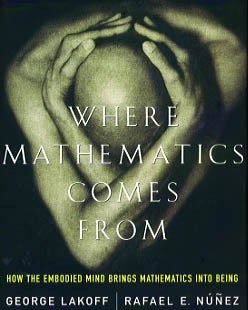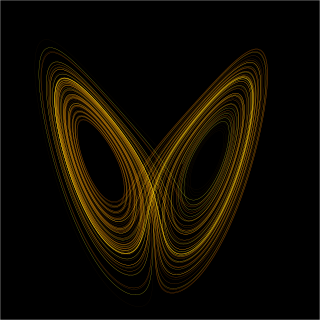Related Research Articles

Eugene Paul "E. P." Wigner was a Hungarian-American theoretical physicist who also contributed to mathematical physics. He received the Nobel Prize in Physics in 1963 "for his contributions to the theory of the atomic nucleus and the elementary particles, particularly through the discovery and application of fundamental symmetry principles".

Where Mathematics Comes From: How the Embodied Mind Brings Mathematics into Being is a book by George Lakoff, a cognitive linguist, and Rafael E. Núñez, a psychologist. Published in 2000, WMCF seeks to found a cognitive science of mathematics, a theory of embodied mathematics based on conceptual metaphor.
The philosophy of mathematics is the branch of philosophy that studies the assumptions, foundations, and implications of mathematics. It aims to understand the nature and methods of mathematics, and find out the place of mathematics in people's lives. The logical and structural nature of mathematics makes this branch of philosophy broad and unique.
Quasi-empiricism in mathematics is the attempt in the philosophy of mathematics to direct philosophers' attention to mathematical practice, in particular, relations with physics, social sciences, and computational mathematics, rather than solely to issues in the foundations of mathematics. Of concern to this discussion are several topics: the relationship of empiricism with mathematics, issues related to realism, the importance of culture, necessity of application, etc.
"The Unreasonable Effectiveness of Mathematics in the Natural Sciences" is a 1960 article by the physicist Eugene Wigner, published in Communication in Pure and Applied Mathematics. In it, Wigner observes that a physical theory's mathematical structure often points the way to further advances in that theory and even to empirical predictions. Mathematical theories often have predictive power in describing nature.

Behavioral economics is the study of the psychological, cognitive, emotional, cultural and social factors involved in the decisions of individuals or institutions, and how these decisions deviate from those implied by classical economic theory.

The following outline is provided as an overview of and topical guide to academic disciplines:
Rigour or rigor describes a condition of stiffness or strictness. These constraints may be environmentally imposed, such as "the rigours of famine"; logically imposed, such as mathematical proofs which must maintain consistent answers; or socially imposed, such as the process of defining ethics and law.

Dynamical systems theory is an area of mathematics used to describe the behavior of complex dynamical systems, usually by employing differential equations or difference equations. When differential equations are employed, the theory is called continuous dynamical systems. From a physical point of view, continuous dynamical systems is a generalization of classical mechanics, a generalization where the equations of motion are postulated directly and are not constrained to be Euler–Lagrange equations of a least action principle. When difference equations are employed, the theory is called discrete dynamical systems. When the time variable runs over a set that is discrete over some intervals and continuous over other intervals or is any arbitrary time-set such as a Cantor set, one gets dynamic equations on time scales. Some situations may also be modeled by mixed operators, such as differential-difference equations.
In physics and cosmology, the mathematical universe hypothesis (MUH), also known as the ultimate ensemble theory, is a speculative "theory of everything" (TOE) proposed by cosmologist Max Tegmark.
The argument from beauty is an argument for the existence of a realm of immaterial ideas or, most commonly, for the existence of God, that roughly states that the elegance of the laws of physics or the elegant laws of mathematics is evidence of a creator deity who has arranged these things to be beautiful and not ugly.
The following outline is provided as a topical overview of science; the discipline of science is defined as both the systematic effort of acquiring knowledge through observation, experimentation and reasoning, and the body of knowledge thus acquired, the word "science" derives from the Latin word scientia meaning knowledge. A practitioner of science is called a "scientist". Modern science respects objective logical reasoning, and follows a set of core procedures or rules to determine the nature and underlying natural laws of all things, with a scope encompassing the entire universe. These procedures, or rules, are known as the scientific method.
The term physics envy is used to criticize modern writing and research of academics working in areas such as "softer sciences", liberal arts, business administration education, humanities, and social sciences. The term argues that writing and working practices in these disciplines have overused confusing jargon and complicated mathematics to seem more 'rigorous' and like heavily mathematics-based natural science subjects like physics.

Applied mathematics is the application of mathematical methods by different fields such as physics, engineering, medicine, biology, finance, business, computer science, and industry. Thus, applied mathematics is a combination of mathematical science and specialized knowledge. The term "applied mathematics" also describes the professional specialty in which mathematicians work on practical problems by formulating and studying mathematical models.
Kumaraswamy (Vela) Velupillai is an academic economist and a Senior Visiting Professor at the Madras School of Economics and was, formerly, (Distinguished) Professor of Economics at the New School for Social Research in New York City and Professore di Chiara Fama in the Department of Economics at the University of Trento, Italy.
The following outline is provided as an overview of and topical guide to social science:

The relationship between mathematics and physics has been a subject of study of philosophers, mathematicians and physicists since Antiquity, and more recently also by historians and educators. Generally considered a relationship of great intimacy, mathematics has been described as "an essential tool for physics" and physics has been described as "a rich source of inspiration and insight in mathematics".
Emmanuel Haven is an academic, author and researcher. He previously held a personal Chair at the University of Leicester (UK) and is currently full professor and the Dr. Alex Faseruk Chair in Financial Management at the Faculty of Business Administration, Memorial University.
References
- ↑ Borovik, Alexandre (November 2006). Mathematics Under the Microscope.
- ↑ Gene Genie
- ↑ Computing with DNA (Scientific American) 1998
- ↑ Velupillai, Vela (November 2005). "The unreasonable ineffectiveness of mathematics in economics". Cambridge Journal of Economics. 29 (6): 849–872. doi:10.1093/cje/bei084. hdl: 10379/1108 . SSRN 904709.
- ↑ Velupillai, K. Vela (2004). "The Unreasonable Ineffectiveness of Mathematics in Economics". Technical Report 6, Economia. University of Trento.
- ↑ Abstract
- ↑ Focardi, S. & Fabozzi, F. (Spring 2010). "The reasonable effectiveness of mathematics in economics". American Economist. 49 (1): 3–15.
- ↑ López de Prado, M. and Fabozzi, F. (2018). Who Needs a Newtonian Finance? Journal of Portfolio Management , Vol. 44, No. 1, 2017
- ↑ Abstract.
- ↑ Irving Fisher (1930). The Theory of Interest: As Determined by Impatience to Spend Income and Opportunity to Invest It; p. 315
- ↑ "Poli seminar abstract". Category Theory Research Center, McGill University. 1999.
Bibliography
- Chaitin, G.J. (1998). Limits of Mathematics: A Course on Information Theory and the Limits of Formal Reasoning . Springer-Verlag. ISBN 978-981-3083-59-2.